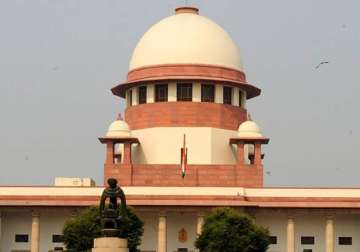Collegium will be back if NJAC Act fails to pass the test of law: SC
New Delhi: The Supreme Court on Friday rubbished government's argument that Collegium system appointed inefficient judges and also there is no chance that the two-decade old system will be revived even if the National Judicial

New Delhi: The Supreme Court on Friday rubbished government's argument that Collegium system appointed inefficient judges and also there is no chance that the two-decade old system will be revived even if the National Judicial Appointments Commission (NJAC) is quashed.
The five-judge Constitution bench, which is hearing pleas challenging the validity of the NJAC Act, observed that the Collegium system will be revived automatically if NJAC Act and the 99th Constitutional Amendment fail to pass the test of law.
The bench, headed by justice JS Khehar, comprises justices J Chelameswar, Madan B Lokur, Kurian Joseph and Adarsh Kumar Goel.
The Centre yesterday wrapped up its arguments backing the NJAC asserting the collegium system had recommended names that were 'not worthy of acceptance'.
Concluding his arguments in the Supreme Court, Attorney General (AG) Mukul Rohatgi promised undeserving appointments would not pass through the NJAC while claiming the collegium chose a person who hardly delivered judgements and later went on become a judge of the apex court.
"It is the collegium system which brings in some judges. I do not want to name. They did not deliver judgments. In the High Court there was one judge who delivered only five judgements ... and became a SC judge," he told SC.
"It is the collegium that gave him (the former judge) laurels after laurels and brought him here (apex court) and sent him to National Human Rights Commission (NHRC)," he said adding that some names were "not worthy of acceptance".
The Bench said it was on "due representation" but the government later gave him the posting in the NHRC.
"One case cannot become the rule. But after his retirement the Government of India has appointed him to an important post in NHRC. Those who come here should have better understanding and it is not that anyone can handle it. Now it is tough to work here as we have to handle many things at a time," the Bench said.
"On the basis of the analysis, it is humbly submitted that the NJAC Act is entirely constitutional and this Hon'ble Court may be pleased to uphold its validity," Rohatgi said while wrapping up his five-day-long arguments in the case.
He also rubbished the contention of Supreme Court Advocates-on-Record Association (SCAORA), one of the petitioners against the new law, that the enabling 99th Constitutional amendment should have been brought before the NJAC Act.
"The law comes into force from the date of notification and the manner and parliamentary procedure cannot be questioned," he said.
Rohatgi also said the tax payers had a right to know the quality of judges getting appointed.
"A tax-payer may say that I pay your (judges) salaries, I have a right to know who is going to be a judge," he said, adding "A judge who has given not more than 50 judgements in 15 years during his stint with various High courts cannot be elevated to the top court."
Rohatgi said a lawyer, who was in his 40s, is entitled to become a SC judge but he was not given a chance and asked whether the collegium ever appointed such a young person as judge.
"It is a changed world now. It is not like those days when there used to be hardly six-seven cases. One who is appointed at that age has to go a long way and will have to handle many things. It would be difficult for them handle the work without experience," it said.
"The Constitutional amendment is not violating the basic structure. We are just trying to bring in such things which people were hardly aware of," the AG said. He also said that no body's right was being affected by this present amendment and it was valid.
"What is so great happening that everything will come to an end. Lets test it first. The questions you are raising are the matter of debate, but, first allow it function," Rohtagi said.
Initiating his arguments, senior advocate KK Venugopal, appearing for Madhya Pradesh, alleged, "The judiciary wrested from the executive the power of judges appointment, consciously withheld by Constitution makers."
He referred to various judgements and constitutional provisions and said that earlier, the executive had the authority to appoint judges and it was taken away by the judiciary in 1993. At the fag end of the hearing, the bench said that the if it decides quash the new law and the constitutional amendment then the collegium system would be "revived".
Backing the NJAC, Venugopal said, "With civil society also represented, the effective mix of these classes will result in judges of the highest calibre being selected, especially because of the secretariat to be maintained, which undoubtedly would have a database of the best judgements delivered by a judge disclosing the extent of his learning, knowledge and common sense as well."
"It is submitted that the inclusion of these eminent persons in the process of appointments is a matter of policy and would in no circumstance violate the independence of the judiciary. In this background, though this issue may not arise for consideration, studies have shown that the presence of lay men or eminent persons would always enhance the quality of the judges selected and consequently would foster independence of the Judiciary," he said.
In April, the government had notified the NJAC Act, 2014 and the Constitution (Ninety-ninth Amendment) Act, 2014 for bringing in a change in the existing system for appointment of judges in Supreme Court and high courts.
The acts provide for a transparent and broad-based process of selection of judges of the Supreme Court and High Courts by the NJAC.